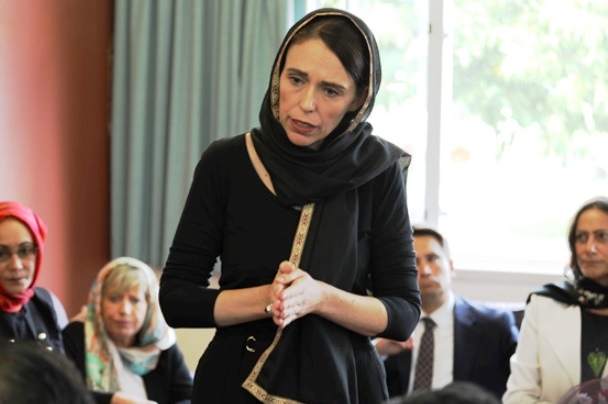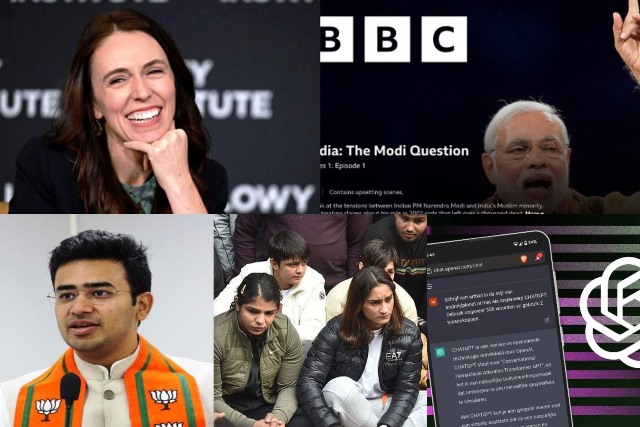Not every leader quits the political power establishment with grace and dignity. Not every leader would easily leave the addiction of power to yet again become a mum, a beloved, a sister, and a back-bencher. Like Jacinda Ardern, former prime minister of New Zealand.
Apart from grace and elegance, she brought in the warm hug, for everyone, including her colleague in the Labour Party, Chris Hopkins, the new prime minister. She also ushered into the realm of power politics, which the people of New Zealand and the world watched with great respect — the eternally life-affirming principles of hope, humanism, kindness and empathy. Her individual life and times while holding power, became a collective dream of an entire nation-state and its people.
Indeed, that is why her everyday public conduct, despite the vicious post-Covid Rightwing trolls, and her goodbye meeting with children and mothers, including people from the indigenous communities, wishing her a deeply-felt farewell, was covered by the entire world media, especially in the West. Now, how many departing heads of countries which are not big players in international finance, politics and diplomacy, which are not superpowers, have found such a warm, almost tearful farewell to a prime minister? If anything, it proves that those who conduct their politics and ‘way of life’ as egoistic bullies or narcissist dictators, and whose adrenaline are driven by the blind following of a fanatic and negative herd mentality, need to learn a lesson from Jacinda Ardern. Will they?
Look at Donald Trump. Look at the mess he has left behind, even while he is backed fanatically by white supremacists who hate the Blacks and immigrants, trapped in a cesspool of charges, and who continues to deny Joe Biden’s victory. Certainly, now, he will not get to be the sole Republican contender in the next presidential polls.
Like him, another former president who publicly denied the deadly pandemic which led to several people dying in America of Covid, Jair Bolsonaro of Brazil, his friend and ally, and who still lives in denial after the victory of Luiz Inacio Lula, allowed thousands to die in his country. Now, having fled to Florida, his fanatic Rightwing followers did a similar public spectacle, as in Ameica, of going violently berserk in the Parliament and Supreme Court of Brazil, with hundreds now cooling their heels in prison.
Even Barack Obama, the first Black president of the USA, who became a global icon of change, optimism and articulation, did not get this kind of mass adulation when he quit, even after two terms. He, of course, did not fulfill the grand vision or the sweet dreams which he had promised, not even for his own community, and he got trapped in the bloody war in Syria which led to large-scale devastation and mass human suffering and migrations. Besides, he left Libya in a mess.
ALSO READ: Naveen Patnaik – The Accidental Chief Minister
Ardern, after all, did not even complete her full term. As she quit, she said: “I’m leaving, because with such a privileged role comes responsibility – the responsibility to know why you are the right person to lead and when you are not. I know what this job takes. And I know that I no longer have enough in the tank to do it justice. It’s that simple.”
How many heads of State can speak this language?
Even an anti-joke in the farewell of Ardern seemed full of warmth where her ‘star power’ was in full display. “It’s like ‘touch her cloak, touch her cloak like Jesus,” a woman laughed to her friend, reported The Guardian of London.
“I would hate for anyone to view my departure as a negative commentary on New Zealand,” she said. “I have experienced such love, compassion, empathy and kindness in the job. That has been my predominant experience. So I leave feeling gratitude for having this wonderful time for so many years… My only words are words of thanks.”
One of the most remarkable ‘national event’ which was conducted by the people of her country, led by her, in a realm where xenophobia, racism, white supremacist ideology and fundamentalism of various hues seems to have spread in the global landscape, was after 50 people were massacred at two mosques in Christchurch, New Zealand. Across the country, women chose to wear headscarves, reflecting their collective support and solidarity for their fellow Muslim citizens. “It was a heartwarming signature stamped across the faces of the women of New Zealand, including its Prime Minister, Jacinda Ardern, who wore a headscarf too, and much earlier, as a leader of a secular nation where all communities are respected and are allowed to live with freedom and dignity,” I wrote in my column then in Lokmarg.
She wore a a black scarf, while hugging the mourning members of the Muslim community, with deep emotion and sadness, spreading a sense of healing across the community, and sending a signal to all concerned who celebrate murder and mayhem in the name of xenophobia. Indeed, women cops wore a head scarf too – holding a gun, while the meeting to mourn the dead was being held.
A doctor in Auckland said (Reuters, March, 2019): “I wanted to say — ‘We are with you, we want you to feel at home on your own streets, we love, support and respect you’”.
Said Bell Sibly in Christchurch: “Why am I wearing a headscarf today? Well, my primary reason was that if anybody else turns up waving a gun, I want to stand between him and anybody he might be pointing it at. And I don’t want him to be able to tell the difference, because there is no difference.”
Compare this with India where Muslim schoolgirls are denied their dream for higher education because they are targeted by banning the Hijab in schools in BJP-ruled Karnataka. Compare this with brilliant, young Muslim scholars, who have stood by the Indian Constitution and have protested non-violently against the communal CAA, are still rotting in jail. Compare this to how mob-lynchers were garlanded by a Union minister, how the call for hate-driven revenge in public platforms have become routine, how the minorities are being pushed to the wall in a secular democracy as second class citizens.
Compare this with how a BBC documentary is banned in an era of internet and social media where nothing can remain inaccessible, how everything gets cloaked behind the iron curtain of ‘pseudo nationalism’, where dissent and dissenters are punished. The lack of grace is as transparent as the absence of empathy and democracy.
A senior journalist once told me a story about how Jawaharlal Nehru was moving in his ‘convoy’ through Cannaught Place in Delhi when he saw two groups of people fighting on the street. He stopped his car and stopped the fight – such was his moral high ground.
Another journalist has told me a story that once Nehru was crossing a town in Himachal Pradesh and he was ‘greeted’ by crowd of government employees who were protesting. Nehru got down from his car and he did what? He scolded the protesters and told them to go back to work, saying that their demands will be sympathetically heard, and that they should not waste their precious time, which, instead, should be devoted for the welfare of the country. The protesters dispersed.
Similarly, Mahatma Gandhi, in his writings and his politics, has often openly accepted his contradictions and imperfections. Even if a journalist would ask a difficult question, like the links of Congress with big money businessmen, he would accept it, and tell the truth.
Come to think of it, even Donald Trump, despite a hostile press, would routinely answer tough questions in his press conferences in the White House. That is the sign of a robust democracy, despite all the contradictions hidden within the inequalities of advanced capitalism.
Indeed, it is easy to become a dictator. However, it could be much easier to become a true democrat and humanist, with deep love for the masses, a connect with the social conscience, while celebrating the eternal values of empathy and compassion. Jacinda Ardern, in her sudden goodbye, tells us of this sublime realism.
Read more: http://13.232.95.176/

